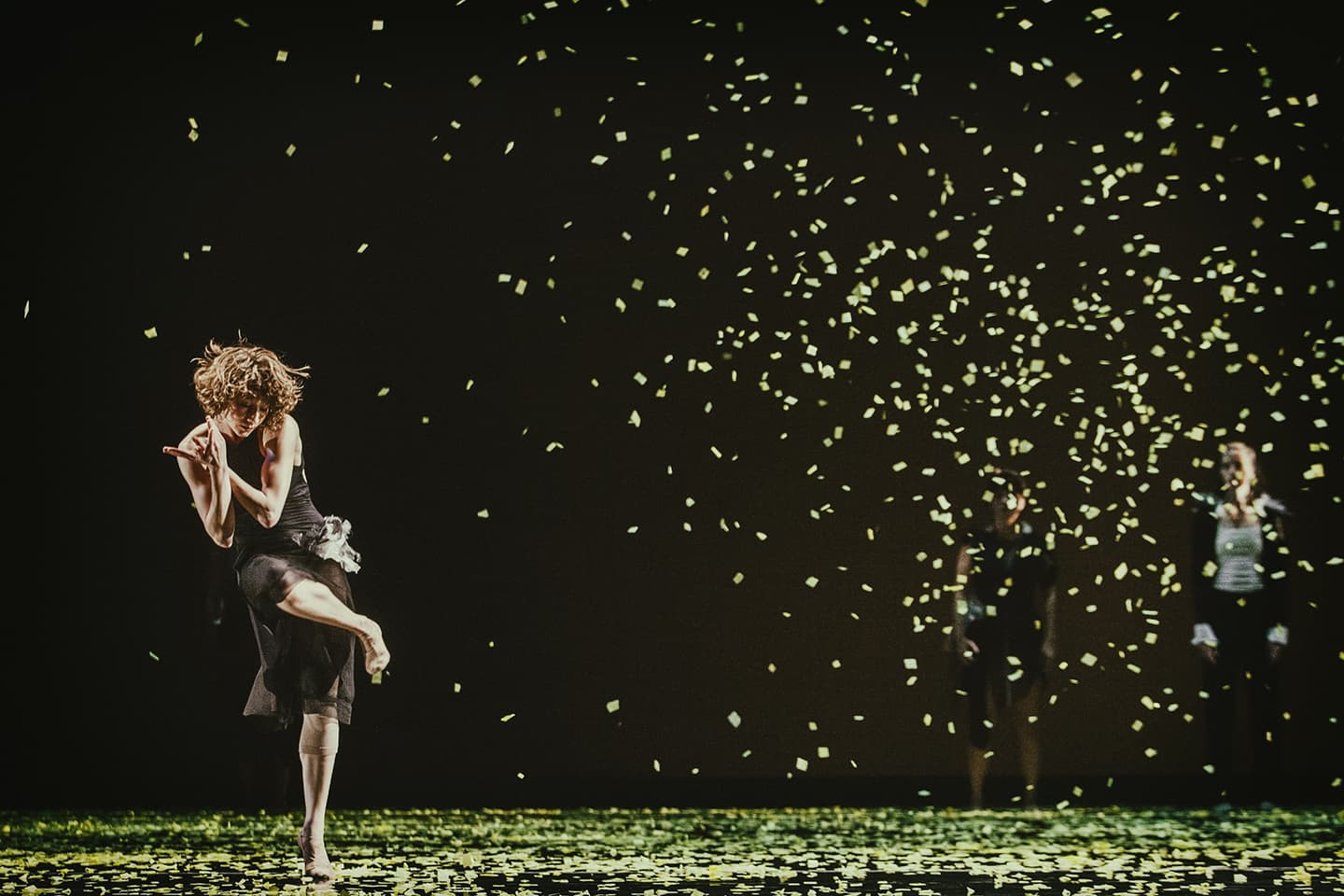Advertisement
San Francisco's ODC/Dance Troupe Brings Climate Change To The Stage

Lime-green confetti covers the ground like a light dusting of snow. Sometimes it falls from above. At other times, it’s manipulated, either thrown from the dancers’ hands or swept across the stage by their movement.
Climate change is not typically a topic of conversation in the theater. But San Francisco-based ODC/Dance is making it one, bringing emotion and humanity to the otherwise methodical matter at hand in KT Nelson’s "Dead Reckoning."
This weekend, the contemporary dance company will perform the piece, as well as a collaborative work titled “Triangulating Euclid,” in its Boston debut at the Institute of Contemporary Art, presented by World Music/CRASHarts.
In the summer of 1971, what is now ODC/Dance began as a collective at Oberlin College, where founder and artistic director Brenda Way was on faculty. The artists continued to work together, and Way relocated her company to San Francisco in 1976, shortly after Nelson joined the troupe.
"I am desperately sad about the deterioration of the environment," said Nelson, choreographer and co-artistic director, in an email interview. "As an artist, I ask myself, if statistics, scientific evidence and analytical narratives on their own do not change our behavior, then what will?"
Perhaps the answer is a different type of approach — a visual and artistic interpretation that has the ability to produce a strong emotional connection with its viewers.
Perhaps the answer is “Dead Reckoning,” a work inspired by Nelson’s trip to Death Valley while on sabbatical in 2013.
The title itself, Nelson explained, is a navigational term, a process of reasoning one’s position without the help of the usual celestial reference points. "When you do so," Nelson said, "you run the very real risk of accumulating error and getting lost."
At one point, the sound of a tree crackling as it collapses adds to the already frantic music, bringing the reality of the situation to life and stimulating an anxious plea for change.
"I hear the inevitability of the tree’s descent, the unpredictable nature of the silent void inside the fall and the crash itself," Nelson said. In the end, a female soloist, like the tree, crumples to the ground after being stepped on by another dancer, one who is either too oblivious or indifferent to notice.
Nelson also had a primary role in the choreographic process of "Triangulating Euclid," which began when she invited Way to collaborate for the first time.
In searching for inspiration, Way said she thought of friend and art conservator Karen Zukor, who was restoring the first printed edition of Euclid’s “Elements of Geometry,” published in 1482. Zukor wrote a paper titled “Triangulating Euclid,” in which she examined the distance between collector, curator and conservator.
Her essay formed the basis of the choreographers’ piece. “We thought we might adopt Karen’s idea of a three-way perspective as a strategy to disrupt our own individual creative process and come at making a work from a different angle,” Way said.
Mirroring the tri-fold format of the paper, the co-artistic directors invited Brooklyn-based choreographer Kate Weare to be the third contributor in the creation process. Not only did they like the idea of expanding the conversation to the East Coast, Way said they felt an affinity to Weare and the passion she had for her craft.
So, the three choreographers set out to explore the distance between themselves and each of their work. “We wanted to journey from the formal elegance of geometry to its human implication,” Way said, “from triangles to threesomes, from lines to connections.”
With such metaphorical thinking, it’s no wonder that ODC/Dance is known for the intellectual depth incorporated into its repertoire. Through movement, the company prompts discussion about a variety of social values, which can be seen in both of these works, but particularly in “Dead Reckoning.”
“I believe art has the capacity to make a person pause and question,” Nelson said. “That moment is a step towards change.”
ODC/Dance performs Friday, Jan. 20, and Saturday, Jan. 21, at the Institute of Contemporary Art.


